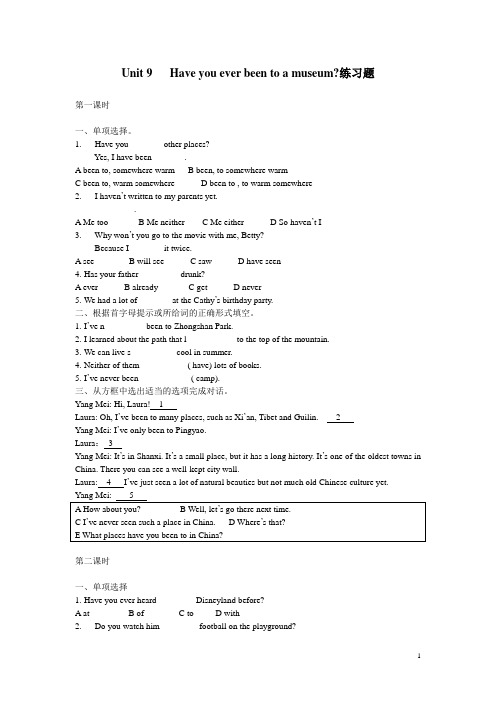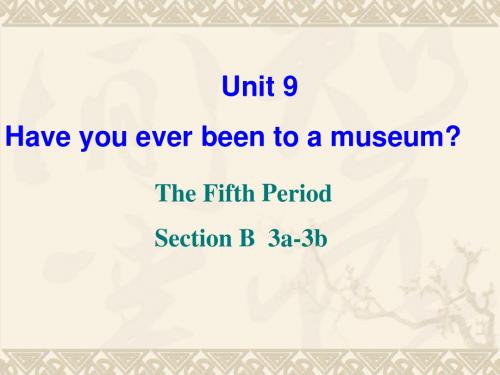Unit_4_Have_you_ever_been_to_an_amusement_park课件
八年级英语下册_Unit_9_Have_you_ever_been_to_a_museum复习题(无答案)(新版)人教新目标版

Unit 9 have you ever been to a museum?复习题I.重点词组默写1.科学博物馆___________________________2.游乐场________________________________3.去某个不同的地方 _____________________4.乘地铁 _______________________________5.玩得高兴,过得愉快____________________6.去滑冰 _______________________________7.导致,引导 ___________________________8.搭起帐篷 _____________________________9.以如此快的方式 _______________________10.下象棋 _______________________________11.许多不同种类的…______________________12.鼓励某人做某事 _______________________13.泡一杯茶 _____________________________14.像…一样享受 _________________________15.几次 _________________________________16.特别的主题____________________________17.在公园里走动__________________________18.一次乘舟行程 _________________________19.搭乘;兜风 _________________________20.举行派对,聚会________________________(单数 have a party)21.做笔记 _______________________________22.成千上万的,许许多多的 _______________23.度假 _________________________________24.一方面…,另一方面…______________________________________25.四分之三______________________________26.一个讲英语的国家______________________27.做某事有困难__________________________28.似乎很奇怪____________________________29.最佳时间做某事________________________30.在一个自然环境中 _____________________31.全年,整年 ____________________________32.接近,靠近,在附近 ____________________33.在白天 ________________________________34.在东南亚_______________________________35.介意做某事 ____________________________II. Grammar Focus 默写1.你曾经去过科学博物馆吗?______ you_____ ______ to a science museum?是的,我曾经去过自然博物馆。
八年级英语下册Unit_9___Have_you_ever_been_to_a_museum过关

Unit 9 Have you ever been to a museum?练习题第一课时一、单项选择。
1.--- Have you _______ other places?--- Yes, I have been _______.A been to, somewhere warmB been, to somewhere warmC been to, warm somewhereD been to , to warm somewhere2.--- I haven’t written to my parents yet.--- _________.A Me tooB Me neitherC Me eitherD So haven’t I3.--- Why won’t you go to the movie with me, Betty?--- Because I _______ it twice.A seeB will seeC sawD have seen4.Has your father ________- drunk?A everB alreadyC getD never5.We had a lot of _______ at the Cathy’s birthday party.二、根据首字母提示或所给词的正确形式填空。
1.I’ve n_________ been to Zhongshan Park.2.I learned about the path that l___________ to the top of the mountain.3.We can live s__________ cool in summer.4.Neither of them __________ ( have) lots of books.5.I’ve never been ___________ ( camp).三、从方框中选出适当的选项完成对话。
新版八年级英语下册unit_9_have_you_ever_been_to_a_museum_Section_A_1

你曾经去过 博物馆吗?
语言目标: 讨论过去的 经历
1a Which of these places would you like to visit? Rank them from 1(most) to 6 (least).
space museum____ history museum____ art museum ____ zoo ____ water park ____ amusement park ____
Listening 2 2a
Look at the map of the town. Listen and circle the places you hear.
Listening 2 2b Listen again and circle T for true or F for false. Conversation 1 1. Tina went to the space museum last year. T/F 2. John has never been to the space museum. T/F 3. They are going to take the subway. T/F
improve
progress
unusual peaceful invented rapid
Have you ever been to science museum?
Yes, I’ve been to a science museum
No, I’ve never been to a science museum Yes, I have. I went there last year,/No, I haven’t. Me, too. And I’ve also visited the nature museum.
Have-you-ever-been-to-a-museum语法

4c. Answer the survey questions and then ask your partner.
Have you ever…
been to another province in China? Lost something important?
Neither my sister nor I am have ever been abroad. 我和我姐姐都没出过国。
My sister has never been abroad. I haven’t, either. 我姐姐没出过国, 我也没有。
neither还可以用于完全倒装句中, 表示“也没 有……”。这种用法和so在完全倒装句中 表示“也……”的用法相对应。如: My sister has never been abroad. Neither have I. 我姐姐没出过国, 我也没有。 Lily likes playing the piano. So has her brother. Lily喜欢弹钢琴, 她弟弟也喜欢。 I am not new here. Neither is Tom. 我不是新来的, Tom也不是。
history museum? B: No, I’ve never__b_e_e_n___ (be) there.
4b. Fill in the blanks with the correct forms of the verbs in brackets.
Most of us __h_a_v_e__s_e_en____(see) Mickey Mouse, Donald Duck and other famous Disney characters in cartoons before. But have you ever _b_e_e_n____ (be) to Disneyland? Disneyland ___i_s__ (be) an amusement park with a special theme —Disney characters and movies. There __a_r_e__ (be) many exciting rides, lovely restaurants and fantastic gift shops there. You
_unit_9_Have_you_ever_been_to_a_museum

现在完成时态中: have been to和have gone to都是指已经 去了某个地方,但是have been to强调 的是曾经去了某个地方并回来了; have gone to强调的是去了某个地方还 没有回来。
【运用】 选用have gone to或have been to完成下 列句子(注意形式变化)。
Have you ever been to a museum?
SectionA1a-2d
Summer vacation is coming,
Where do you want to go? I want to go… Do you want to go to…?
GUESS
Guilin 你曾经去过 某地吗?
T F
Conversation 3
Harvey had a great time at Water World.
T F
T F ○
John has never been to the space museum.
T F
Linda went to the zoo three times last year.
太空博物馆
历史博物馆
Me neither.(Neither have I.\I haven’t been to a history museum,either)我也不 注意:neither (adj.\pron.\adv.\conj.)两者都不(的), 也不 (1) neither +n.单数 (2)作主语视为单数,(三者或以上)都不none (3) “….也不 ”放句首构成部分倒装 Neither+助\be\情+s(主) .…也不. So +助\be\情+s(主) …..也 (4) Neither. ….nor…既不…也不… 连接同一性 质的单词和短语。作主语时,谓语动词要就近原 则
Unit 9Unit_9_Have_you_ever_been_to_a_museum B 3a-3c

6. — What about these two sweaters,madam? — _____of them fits me. Could you show me another one? A. Both B. Either C. None D. Neither 7. — Where is Zhang Ming? — Oh, don’t you know he _____ to Beijing to see his parents and he’ll be back tomorrow? A. has gone B. has been C. had gone
One great thing about … is …
One
great thing about Hainan is that you can try many kinds of sweet fruit in Hainan. If you go to Hainan, I’m sure you will enjoy yourself.
(3a)
Pre-writing
Make a list of facts about your hometown or a place you have been to. Think about these topics.
Size and location:_________________ Population:_______________________ Weather:________________________
Things:___________________________
Hainan Island
Have you ever tried/seen/been…?
unit9-Have-you-ever-been-to-a-museum(1)

1. 我去过北京两次。 2.Ih_a_ve____b_e_e_n___ _t_o___ Beijing twice. 3.2. 大声读书是一种学习英语的好方法。 4.Reading aloud ias _g_o_o_d_w_a_y_ _t_o__ learn English. 5.3. 昨天他没有去那,我也没去。 6.He didn’t go there yesterday. 7M.__e___ _n_e_it_h_e_r___. =Neither did I.=I didn’t go there, either.
again by bike.
T /F
Conversation 3 Frank had a great time at Water park. TF Frank’s friend has never been to Water park. TF Frank and his friend are going skating.
【归纳拓展】 neither的用法小结 作副词, 常用于短语“neither. . . nor. . . ”, 连接并列成分, 意为 “既不……也不……”, 当连接并列主语时使用就近原则。
Neither I nor my mother _l_ik_e__s(like) red.
我和妈妈都不喜欢红色。
1a Which of these places would you like to visit? Rank them from 1 to 5.
space museum 太空博物馆
__History museum 历史博物馆
art museum
艺术博物馆
water park
水上公 园
zoo
动物 园
人教版 八年级英语 下册 Unit_9_Have_you_ever_been_to_a_museum

dish.
Tapescripts:
Boy 1: So, Peter, how long have you been in China? Peter: I’ve been here for two weeks, but I’m going back to Australia tomorrow. Boy 1: Have you traveled much? Peter: Yes, I have. I’ve seen many interesting things. Boy 1: Have you visited the Palace Museum? Peter: Yes, I have. I went there last week. It was wonderful. There were so many beautiful treasures. Boy 1: And have you been to the Great Wall?
1st listening
1b
Listen to a student interviewing a foreign student. Check (√) the questions you hear.
___√_ Have you visited the Palace Museum?
___√_ Have you been to the Great Wall?
- 1、下载文档前请自行甄别文档内容的完整性,平台不提供额外的编辑、内容补充、找答案等附加服务。
- 2、"仅部分预览"的文档,不可在线预览部分如存在完整性等问题,可反馈申请退款(可完整预览的文档不适用该条件!)。
- 3、如文档侵犯您的权益,请联系客服反馈,我们会尽快为您处理(人工客服工作时间:9:00-18:30)。
1. I am a doctor. I began to work when I was 22.Now , I am 26. I have worked for four years. ________ 2. We went to the USA last Monday. Today is Monday . We _________ have stayed (stay) in the USA since last Monday.
the Present Perfect Tense
现在完成时
助动词have (has)+过去分词 过去分词done 助动词 过去分词
past
Yesterday , we cleaned the classroom.
now
Now , the classroom is clean because we have cleaned it.
since ______three o’clock ’ for
______two days since ______yesterday afternoon since ______I came here
since
______last Sunday
A 1.They’ve known each other since_______.
4.You are going to a restaurant this evening. You phone to reserve(预定)a table. 预定) 预定 Later your friend says ‘Shall I phone to reserve a table? ’You say: I have already done No,__________________ it (do)
past
I began to teach English at this school five years ago.
now
I have taught English at this school for five years.
用法2 用法2:
过去发生的动作一直延续到现在。 过去发生的动作一直延续到现在。 延续到现在
3. 现在完成时往往同表示不确定的过去时 间状语连用,如 间状语连用 如already, yet, just, before, recently, still, lately等: 等 He has already finished his work. I haven't seen him recently (lately). We have seen that film before. Have they found the missing child yet ?
3.You are eating in a restaurant this
evening. The waiter thinks you have finished and starts to take your plate away.You say: Wait a I haven’t finished it yet. ’ moment !_______________________ ( not / finish )
Yet:
“仍然,还 ” 用在疑问句和否定句 仍然, 中,放在句末。 放在句末。 I haven’t read this book yet . ’ Have you had breakfast yet ?
ever
曾经” “曾经”通常用于疑问句 和肯定句中,放在句中 放在句中。 和肯定句中 放在句中。 I have ever seen this film. Have you ever been to the USA ?
非延续性动词不能与时间段连用: 非延续性动词不能与时间段连用: go/come/begin/start/die/buy/borrow/sell/leave/arrive/ receive/become等词语是瞬间动词表示的动作是一时的, 等词语是瞬间动词表示的动作是一时的, 等词语是瞬间动词表示的动作是一时的 不能延续,不能与for、 等表示一段时间的词连用, 不能延续,不能与 、since等表示一段时间的词连用, 等表示一段时间的词连用 也不能用于how long引导的疑问句中。 引导的疑问句中。 也不能用于 引导的疑问句中 如不能说: 如不能说:He has borrowed the book for two months.(ⅹ) ⅹ 但可以说: 但可以说:He has kept the book for 2 months. 或:It has been 2 months since he borrowed the book. 或:Two months has passed since he borrowed the book.
I have lost my wallet. (含义是 现在我没有钱花了 含义是:现在我没有钱花了 含义是 现在我没有钱花了.) Jane has just had it. (含义是 简现在不饿了.) 含义是:简现在不饿了 含义是 简现在不饿了 Michael has been ill. (含义是 现在仍然很虚弱 含义是:现在仍然很虚弱 含义是 现在仍然很虚弱) He has returned from abroad. (含义是 现在已在此地 含义是:现在已在此地 含义是 现在已在此地)
Exercise 根据所给情况,用just,already或yet造句。 或 造句。 根据所给情况, 造句 1.After lunch you go to see a friend at her house.She says‘Would you like ‘ something to eat?’ You say: No, ’ I’ve just had lunch. thank you. _______________( have lunch ) 2.Joe goes out. Five minutes later,the phone rings and the caller says ‘Can hespeakjust Joe?’ You say: I’m out I has to gone’ ’ afraid _________________.( go out )
2. 现在完成时可以用来表示发生在过 现在完成时可以用来表示发生在过 去某一时刻一直持续到现在的动作和 状态,常与表示持续的时间状语连用. 常与表示持续的时间状语连用 状态 常与表示持续的时间状语连用 表示持续动作或状态的动词多是延续 表示持续动作或状态的动词多是延续 性动词。 性动词。 I haven’t seen her these days. ’ Mary has been ill for three days. I have lived here since 1998.
填空。 一、用for和since填空。 和 填空
for ______three
hours
_______a week for for _______a long time since _______1997 for ______two weeks since _______three years ago since _______ last month
பைடு நூலகம்
since and for
The woman has worked at this school for 2 years.( since two years ago) for + 时间段 for 2 years/a long time
since 2 years ago since+时间点 since+时间点 since 1998 since she came to the school)
A.1995
B. three years
B 2.I’ve been interested in Chinese for______.
A. last year B. one year 3. She has been a doctor for______. A A. two years B.two years ago 4. I’ve had a headache since_______. A A. I got up this morning B. five hours 5. We’ve been here for______. B A. one hour B. one o’clock
A 7. They’ve been in love since______. ’ B 8. We have known each other since_____.
9. --How long have you been like this?
A --Since______. st night
10.--How long has she worked here? --She has worked here for_____. B A. 1993 B. six years
“已经”通常用于肯定句中,放在句中。 已经”通常用于肯定句中 放在句中。 放在句中 already: I have already read this book. 有时,也用在疑问句中表示惊讶。 有时,也用在疑问句中表示惊讶。 Have you eaten up all the food already ?
4. 现在完成时常常与表示频度的时间状语 连用,如 连用 如 ever, never, twice等: 等 Have you ever been to Beijing? ? I have never heard of Bunny. I have used this pen only three times.
before
放在句末。 放在句末。 Ihave never read this kind of books before.
